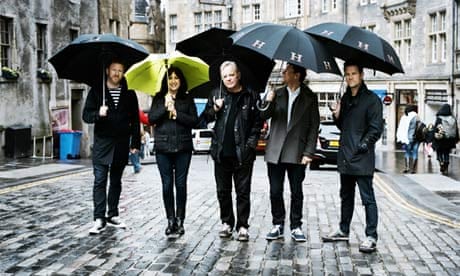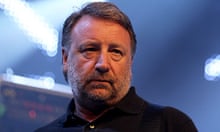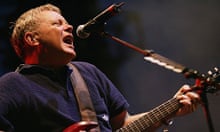At the pavement table of a hotel bar on a sunny Sunday afternoon in London, Bernard Sumner is revisiting the most calamitous concerts of New Order's career in the kind of gleeful detail that your average musician would reserve for moments of glory. There was the time at Roskilde in 1984 when they appeared late and drunk with out-of-tune equipment and played so badly that the police were called to protect them from the crowd. Then there was the show in Boston when they performed for just 20 minutes in between DJ sets. "The police turned up in the dressing room," Sumner remembers, "and said: 'Do you know there's a fucking riot going down there, man?' There were people throwing stones at us when we came out. I got a phone call the next morning from Mo Ostin, the president of [New Order's US label] Warner Bros: 'What the fuck's going on Bernard?'"
He smiles. "It's a very Mancunian trait – don't take yourself too seriously. It was more important for us to have a laugh than have some great career strategy. If we enjoyed what we were doing, that was a great career strategy."
Few bands have been as mythologised as New Order and their previous incarnation Joy Division – the members have been played on screen twice, in Anton Corbijn's sombre-hued Control and Michael Winterbottom's antic 24 Hour Party People – while showing so little interest in mythologising themselves. Let others talk about how New Order rebounded from the suicide of Joy Division frontman Ian Curtis to become one of the greatest bands of the 80s, or how records such as Blue Monday revolutionised the way rock groups assimilated electronic music. Sumner would rather talk about the time in the studio when, emboldened by MDMA, he performed his own northern version of Donna Summer's orgasmic vocal on Love to Love You Baby. "It was like: 'Come on love, come on love, oargh, oargh.' But everyone decided it sounded more like I was straining on the toilet."
The singer's uncommonly cheerful mood is down to the fact that New Order are, once again and most improbably, back from the dead. Barely a year ago, drummer Stephen Morris was telling the Guardian: "There's no future for New Order." Yet here they are, amid an ad hoc world tour, a few hours before playing the closing concert of the Olympics in Hyde Park, alongside Blur and the Specials on a bill of bruised but unbowed national treasures. Sumner, a man who once walked around backstage with a sign around his neck that read "Fuck off, don't ask me any questions", radiates high spirits and wry amusement. The only smudge on his good mood is the incessant growl of a taxi idling outside the hotel. "It's a noisy world we live in, isn't it?" He shouts at the taxi driver and the city in general: "Shut the fuck up, the lot of you!"
New Order's latest resurrection has been marvellously unexpected, albeit coloured by a significant absence. When bassist Peter Hook quit in 2007, he declared the band over and Sumner formed a new group, Bad Lieutenant. But exactly a year ago came news that New Order would be reuniting, minus Hook but plus long-absent keyboardist Gillian Gilbert, for two benefit shows for music video producer Michael Shamberg, who was seriously ill with encephalitis. Those concerts went so well that they led to many more, including this weekend's Bestival. So did they really believe last summer that it was all over?
"Who knows what's around the corner?" Sumner says, deflecting the question with a bit of qué será, será. "I've had moments when I've thought, Fuck them, I've had enough. But once the anger dies down, the clarity pulls through. There comes this point where you've got this weight of history pushing you along, like a flywheel keeps an engine rolling round. You're not willing to give up the past 30 years of hard graft, blood, sweat and tears because someone else has had a tizzy fit, y'know?"
When Sumner is relating a favourite anecdote from the 80s he refers to the absent bassist as "Hooky", but in the current context it is always "someone else" or "the other one". New Order have had rifts before, which is why they have only made three albums in the past 20 years, but all the current members agree this split feels permanent, caused by something more than the usual friction between the emotional bass-player and the drier, more reserved (some say passive-aggressive) singer. When I talk to Phil Cunningham, guitarist in New Order and Bad Lieutenant for more than a decade, he says wearily, "It's not about Hooky and Bernard. It's Hooky and the rest of the world."
I suspect that for the famously private Sumner, the last straw has been Hook's public axe-grinding since his departure. His claim that replacement bassist Tom Chapman mimes to backing tracks and his sideswipes at Sumner in his new memoir Unknown Pleasures: Inside Joy Division are just the most recent examples. "He's not been very nice," says Sumner with acidic understatement. "To boil it down to its basic elements, if someone's horrible a lot of the time, you're not sad when they're gone, you're glad. He wasn't happy in the band – primarily with me but also, it seems, with almost everyone. If you're unhappy, OK, fine, but go away and do something else and don't bitch about us anymore."
Of course, no outsider can ever know enough to take sides when old friends fall out. A clearly upset and self-questioning Hook told Mojo earlier this year: "I'm so fucking confused with it all, and so obsessed with it all, I don't know even now what's going on." But without doubt his big mistake was believing the band couldn't continue without him, when New Order's very existence is testament to their extraordinary resilience. After Curtis killed himself in 1980, the surviving members of Joy Division swiftly reinvented themselves, with Gilbert (then, as now, Morris's partner) joining on keyboards and Sumner assuming frontman duties. "I like a challenge. I like learning new skills, because I didn't learn much at school," he says. "And we had no choice. You couldn't just bring in a stranger to take his place. It was Ian Curtis, for God's sake! So it had to be one of us."
There have been other premature deaths over the years: producer Martin Hannett in 1991, manager Rob Gretton in 1999, and Tony Wilson, the quixotic boss of the Factory label whose business instincts lagged some way behind his artistic vision, in 2007. Has Sumner ever felt unlucky? "No," he says, "I feel lucky it's not me! Perhaps that's the reason we're better behaved than we used to be, because all those people having quite early deaths makes you aware of your own mortality."
Gilbert is equally matter-of-fact when discussing what kept her out of the band for so long. She took indefinite leave in 2001 to care for her and Morris's youngest daughter, Grace, who was diagnosed with the neurological disorder transverse myelitis. "New Order rehearsed at our studio, right next to where we lived, so I could still hear them," she says, taking Sumner's place at the pavement table while Morris attends to some last-minute technical emergency in Hyde Park and their eldest daughter Tilly loiters nearby. "It was horrible for the first year, but I got used to it. I mean, things have to carry on."
In 2007, just as it was looking as if there would be no band to return to, she developed breast cancer. "I knew something was going on but when the break-up started I was going through chemotherapy and you just feel like nothing else matters. Now I've come out of that and stepped into this new line-up and we haven't got any of those issues any more."
Gilbert says she was stunned when the audience at her comeback show in Brussels last September greeted her with chants of "Gillian! Gillian!" She generally finds it "weird" to be reminded what a powerful grip this band's history exerts on its fans. "You don't realise you've got that sort of history because you're doing it. It's like when Control was being filmed in Macclesfield, you'd think: Why are they making a film about Joy Division?"
While Control told the story of that band's short life and abrupt demise, 24 Hour Party People splashed across the screen the inspirational chaos of Tony Wilson's Factory. The Hacienda, Wilson and Rob Gretton's audacious attempt to give the city they loved the club of their dreams, became a financial black hole into which years of New Order royalties vanished without trace.
"People say: 'Surely it wasn't like that, they've used a bit of artistic licence,'" says Sumner. "But generally it was worse than that. We never got any accounts the whole time we were on Factory, but we didn't ask to see any accounts either. I think we used to get the touring income while they used to waste the record money. But we're not hard done to. I think every day how incredibly lucky it is that I travel around the world playing to thousands of people. Fucking hell, long may I live, y'know? I've been touched by the hand of God."
If Joy Division's career has the stark precision of a novella, then New Order's reads like a baggy, tragicomic picaresque, studded with arrivals, departures, false endings and sudden twists. "In Joy Division, we did our learning in private, in dusty rehearsal rooms above pubs," says Sumner. "[New Order] had to learn in public. Hurt [a 1982 B-side] was really just an experiment to learn how to use a synthesizer. Instead of reading the instruction manual, let's write a song with it and, y'know, sell it to people. But when you try to play them live, you're a bit like, 'Oh God, where's the chorus? Oh right, there isn't a chorus.'" Cunningham says that while rehearsing the 1983 track 586 for this tour they watched footage of old performances and an aghast Sumner asked, "How did we get away with being so shit and we're still here today?"
This is why, although you can hear New Order's influence in countless bands, nobody uses their career as a blueprint. Like most of Sumner's lyrics, it doesn't make any sense on paper. Their brilliance grew out of flirting with disaster: the awkward experiments that paved the way for stunning breakthroughs, the chaotic concerts that crystallised in moments of wild magic, the puzzlingly opaque lyrics that could be either ridiculous or sublime.
One collision of novice synth-tinkering and last-minute lyrical improvisation led to Blue Monday, their boldest and most beloved song. Sumner tells a very New Order story about being asked, in the 80s, to adapt the song to advertise Sunkist. Gretton, a man of staunch socialist principles, was in hospital and the money was great so they said yes. "The lyrics were something about when you're drinking in the sun, Sunkist is the one," says Sumner, laughing. "I was like, 'Fucking hell, I can't sing that.' So Hooky wrote down £100,000 on a piece of paper and put it on the mixing desk and said: 'Try singing it now.' So I sang it, and then Rob came out of hospital and was like, 'What have you stupid bastards been doing while I've been in hospital?' and put the kibosh on it straight away."
So there is no point expecting this strategy-averse band to know where they go from here. Perhaps there'll be a new album or perhaps this is just a cathartic and hard-earned lap of honour. At the moment, it doesn't appear to concern them either way. For the first time in years, they are thoroughly enjoying being in New Order.
"In May, my dad died," Gilbert says by way of explanation. "We'd started up again and my dad thought it was fantastic. He couldn't wait to hear all the stories and where we'd been and it was just like starting in a band again for me. We thought he was going to recover, but he didn't. It was weird because then we were off to do another gig. It's only when you go home and think, God, he's not there anymore, that it affects you. You're not going to be here one day so you should just get on with it and enjoy it. And I think that's what we're doing. We're celebrating our past, because we've gone through a lot. We're celebrating that we're still here."
New Order headline Bestival on Saturday 8 September.




Comments (…)
Sign in or create your Guardian account to join the discussion